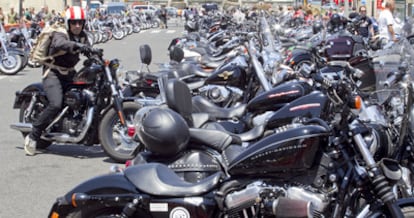Stop, police! Where did you buy your Harley?
Spanish authorities impound hundreds of "non-standardized" secondhand motorcycles
Hundreds of Spanish Harley-Davidson owners are angry because they cannot take their bikes out on the road, lest they be impounded by the Civil Guard. The legendary two-wheelers have to be "standardized" to ride the Spanish roads. The standardization certificate is carried only by bikes proceeding, new or secondhand, from Harley-Davidson concessions in Spain.
The owners' association points out that the Spanish Traffic Department is causing all independently imported secondhand Harleys to be impounded, and that charges are being laid against owners for carrying improper documents. All this, even though the immense majority of Harleys have passed the requisite ITV roadworthiness test, and are outwardly identical to those sold by official company franchises in Spain. What is going on?
According to Francisco Gualda of the owners' association, the number of impounded bikes may soon reach 5,000. These are secondhand motorcycles that have been imported from the United States, where they are perfectly legal. The owners have acquired them in Spain in establishments open to the public, and they have the ITV certificate issued by the regional governments. The buyers save, in their words, between 10 and 20 percent of the purchase price (a reduction of 800 to 2,000 euros) by buying their machines in this manner, which an industry expert denies. "Nobody risks losing his bike for 800 euros. It must be a lot more."
According to the Civil Guard, these vehicles must carry a countersign of individual standardization, having been imported independently from the US. However, according to the owners, this countersign is impossible to obtain by a private individual. The General Director of the Traffic Department denies that the department has undertaken a campaign against independently imported bikes. "If their papers are not in order, they cannot be driven. It's that simple."
Josep Grañó of Harley-Davidson España maintains that imported secondhand bikes and those sold by his company's dealers "are different," since they have different engines. "For this reason, we can't repair them, as we would need another sort of tools," he explains, adding that there are other differences. "The imported ones do not comply with standards on CO2, noise, blinkers, odometers, or exhaust pipes. In the United States, the Euro II and III [standardization certificates required in Europe] simply do not exist."
He adds: "The motorcycles brought in by Harley-Davidson España have the European 5HD countersign, while the Americans have the 1HD. The first can run in Spain, the second can't, and these [the 1HD] are the ones being brought by the used bike importers, though they are non-standardized models."
But Gualda, legal counsel for the owners, denies this and says they are the same. "The 1HD and 5HD are both American countersigns. The 1 is for sale in the US, the 5 for export. But both are purely marketing digits. It's the same machine." Gualda goes on: "The Civil Guard take away our papers and send us home with a paper that only enables us to go to the garage. Sometimes they impound , but there are so many on the road, that in some police stations they are waiting for a solution to this problem."
Harley-Davidson España, which firmly denies being behind the impounding of the vehicles, believes some regional ITV inspection centers are handing out large numbers of ITV certificates to machines that do not comply with Spanish safety and pollution norms. The firm claims that it was the Civil Guard's investigation unit GIAT that began the investigation after finding that Harley sales in some provinces suddenly shot up from around one a month to 50 a month. "We have never reported anyone," says Grañó, adding that such bikes may be standardized by his firm, at a cost of 1,200 euros. Meanwhile, the GIAT has declined comment.

Tu suscripción se está usando en otro dispositivo
¿Quieres añadir otro usuario a tu suscripción?
Si continúas leyendo en este dispositivo, no se podrá leer en el otro.
FlechaTu suscripción se está usando en otro dispositivo y solo puedes acceder a EL PAÍS desde un dispositivo a la vez.
Si quieres compartir tu cuenta, cambia tu suscripción a la modalidad Premium, así podrás añadir otro usuario. Cada uno accederá con su propia cuenta de email, lo que os permitirá personalizar vuestra experiencia en EL PAÍS.
¿Tienes una suscripción de empresa? Accede aquí para contratar más cuentas.
En el caso de no saber quién está usando tu cuenta, te recomendamos cambiar tu contraseña aquí.
Si decides continuar compartiendo tu cuenta, este mensaje se mostrará en tu dispositivo y en el de la otra persona que está usando tu cuenta de forma indefinida, afectando a tu experiencia de lectura. Puedes consultar aquí los términos y condiciones de la suscripción digital.








































